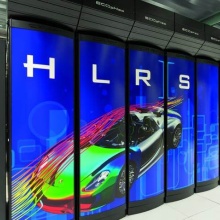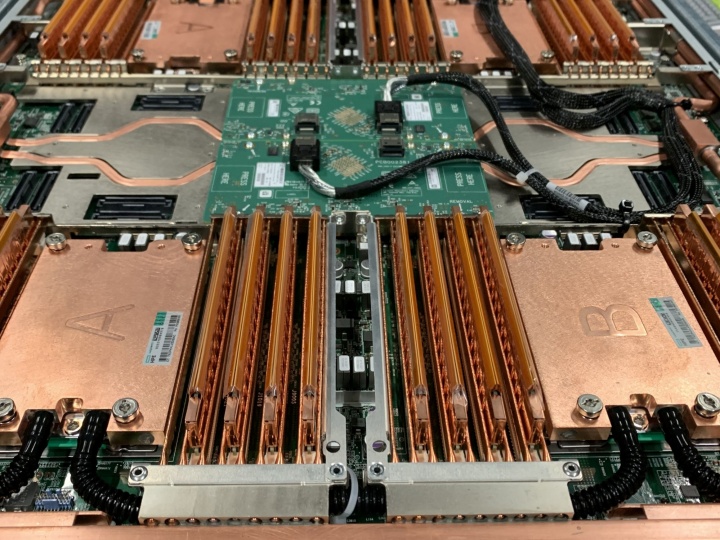Three new projects being led by the High-Performance Computing Center of the University of Stuttgart (HLRS) will create a Europe-wide network of national competence centers for high-performance computing (HPC), promote the sharing of HPC knowledge and resources across borders, and facilitate HPC access for small and medium-sized enterprises (SME's). The projects hold the potential to raise European expertise in cutting-edge technologies for simulation, artificial intelligence, and high-performance data analytics and to promote the wider adoption of HPC technologies for research and technology development.
European initiative EuroHPC Joint Undertaking
In 2018 the European Union launched the EuroHPC Joint Undertaking, a pan-European effort to build a sustainable and globally competitive ecosystem for European high-performance computing. When EuroHPC began, it immediately focused on coordinating issues related to infrastructure and resource allocation, technology development, and the creation of advanced software. It also quickly became clear, however, that an additional key to EuroHPC's success would be to develop a consistently high level of HPC expertise across the continent.
Three new projects at HLRS
On September 1, 2020, HLRS and its partners across Europe celebrated the official kick-off of three new projects to build this expertise:
- EuroCC (National Competence Centres in the Framework of EuroHPC)
- CASTIEL (Coordination and Support for National Competence Centres on a European Level)
- FF4EuroHPC (HPC Innovation for European SMEs)
As the principal coordinating center for all three of these projects, HLRS will be at the center of steering this important effort, which will simultaneously pursue multiple, integrated strategies for growing European HPC capabilities.
The fact that HLRS is coordinating all three projects will offer great opportunities to maximize synergies.
Dr. Bastian Koller, Managing Director at HLRS
“EuroCC, CASTIEL, and FF4EuroHPC have complementary goals, and the fact that HLRS is coordinating all three will offer great opportunities to maximize synergies,” says HLRS Managing Director Bastian Koller, who is spearheading the coordination of the projects. “By raising the level of HPC expertise, improving collaboration, and paying particular attention to industry, including the SME's that form such a critical part of the EU's economy, we see great potential to improve the productivity and impact of HPC for academic research, industrial R&D, and public administration across Europe.”
To begin laying a foundation to build this expertise, EuroCC will create a Europe-wide network of national competence centers. At the time the project launched, 33 participating member states had each already designated one HPC center as a national competence center.
Each competence center will undertake an audit of HPC competencies at the national level, identifying available expertise and knowledge gaps across the country. Over time, the competence centers will become national resources for identifying and coordinating technical knowledge, training resources, industrial outreach, and HPC services and tools for all computing centers in their home countries.
Simultaneously, HLRS, together with other prominent European HPC centers, will also lead a related activity called CASTIEL. While EuroCC coordinates HPC expertise within each member state, CASTIEL will lead activities to promote interaction and the exchange of expertise across the entire EuroCC network.
Following the inventories of competencies at the national level, CASTIEL will develop a Europe-wide competency map that will catalog both available resources and knowledge gaps across all EuroCC competence centers. Once these are identified, it will then coordinate activities such as international workshops, mentoring and twinning partnerships, and topic-specific working groups to address issues of shared interest.
Such activities, the project organizers anticipate, will promote Europe-wide knowledge sharing and the identification of new kinds of productive interaction. They might involve, for example, train-the-trainer programs focused on advanced programming methods or best practices in HPC center operation. The improved international dialogue could also lead to regional collaborations between centers in which resources are pooled to address complementary needs.
Because HPC centers in different countries have different levels of engagement with industry, another important component of CASTIEL will involve providing knowledge and expertise necessary to address HPC needs that are unique for industrial R&D.
The third pillar of this effort, called FF4EuroHPC, will undertake targeted outreach to small and medium-sized enterprises, smoothing access to HPC technologies and solutions that will make them more competitive.
FF4EuroHPC will organize two open calls for proposals from SME's that can demonstrate compelling cases for using HPC in engineering, manufacturing, or other relevant sectors. Proposals are welcome not only for traditional applications of HPC for simulation and modeling, but also for new kinds of applications involving high-performance data analytics (HPDA), machine learning, and artificial intelligence. Outstanding proposals will receive support through FF4EuroHPC to undertake “application experiments” using HPC. As the project proceeds, these experiments will result in a portfolio of success stories demonstrating the innovation potential of HPC.
Towards a pan-European HPC community
As Koller explains, “The success stories that emerge, as well as the dialogue that takes place surrounding these three projects, will raise awareness across Europe about the opportunities that HPC offers. This includes not only among researchers and companies whose work might benefit from supercomputing, AI, or HPDA, but also governments and other stakeholders responsible for developing and maintaining HPC resources and services.” Such awareness will also be necessary to build towards the unified, world-class HPC community that EuroHPC is working to create.




